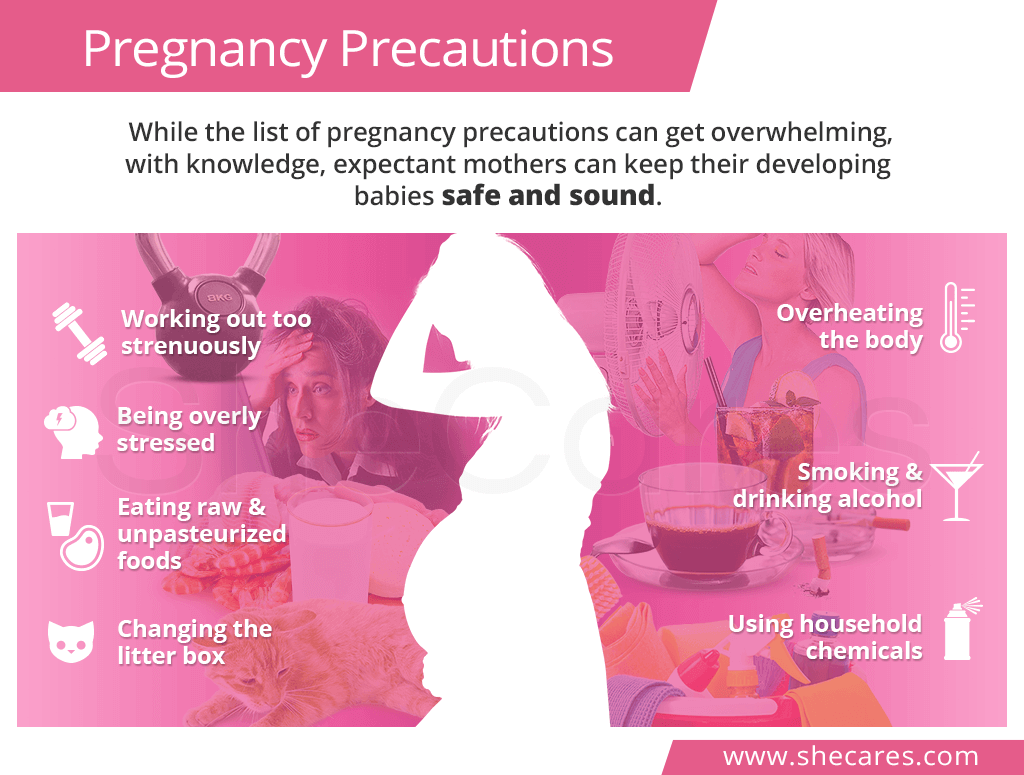1. Working Out Too Strenuously
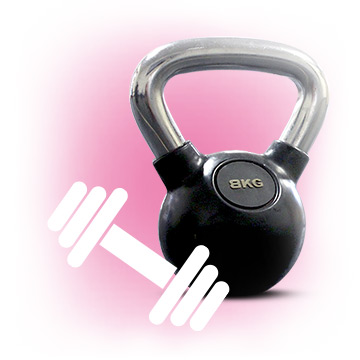
Although exercise during pregnancy has been shown beneficial for enduring the demands of childbearing, what should pregnant women avoid is exercising too much as it can negatively affect the progression of pregnancy and put a woman and her baby at risk of injuries and potential pregnancy complications.
Strenuous exercises and sports, like skiing, basketball, or horseback riding, should be replaced with safer, moderate-level exercises, including brisk walking, swimming, or pregnancy yoga. Opting for 150 minutes of exercise per week is optimal1.
2. Eating Raw & Unpasteurized Foods
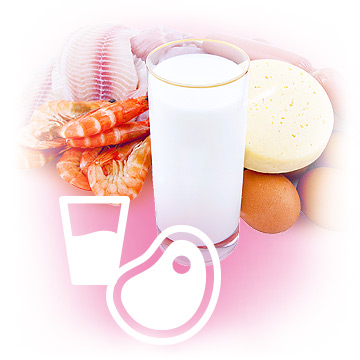
While it might be tempting to give in to sudden cravings, pregnant women should avoid foods that might contain bacteria or heavy metals, both of which have been linked to birth defects, miscarriage, and stillbirth. They include raw fish and meats; unpasteurized dairy; cold cuts; and mercury-rich fish2.
Great additions to a pregnancy diet might include a balanced combination of foods from five groups: grains; fruits; vegetables; dairy; and fish, meat, eggs, or beans. Plenty of water is a must, too!
3. Being Overly Stressed

During the nine months of pregnancy, it is reasonable to expect occasional stresses, whether it be due to natural parenting anxiety, common discomforts, or personal issues.
Yet, excessive, prolonged stress during pregnancy can negatively affect the health of the mother and her baby not only while still in womb, but also later on in life. When not promptly relieved through meditation, exercise, or breathing techniques, severe stress can lead to premature birth and low birth weight as well as cognitive and behavioral problems3.
4. Changing the Litter Box

One of the common pregnancy precautions concerns the least probable suspects - kitties, specifically their litter boxes. Indeed, bacteria responsible for causing a serious infection called toxoplasmosis can linger in soiled cat litter boxes. If passed to the baby in the womb, it can restrict his or her growth, cause brain damage, and lead to premature birth.
While petting one's kitty during pregnancy is safe, expectant mothers - as well as those who are preparing to get pregnant - should keep clear of changing the litter box starting up to three months before conceiving and throughout the duration of pregnancy4.
5. Overheating the Body
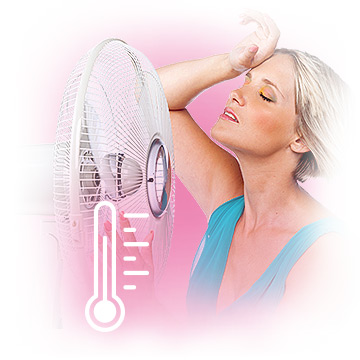
Another one on the list of things to avoid during pregnancy is overheating. While elevating body temperature slightly from the normal 98.6°F (37°C) is not harmful, allowing the temperature to rise above 102°F (38.9°C) for more than 10 minutes can lead to neural tube defects, miscarriage, or dehydration, depending on the pregnancy stage5.
Consequently, pregnant women are advised to avoid using saunas, taking long showers, or applying heating pads. They should also be cautious when spending time or exercising outdoors in the summer. Wearing loose, breathable fabrics and hats as well as remembering about proper hydration are key as well!
6. Smoking & Drinking Alcohol

It might seem like an obvious pregnancy precaution, but smoking and drinking alcohol are two of the most essential things to avoid during pregnancy as both substances can cross the placenta and harm the baby.
Both first- and second-hand smoking should be avoided as it can lead to complications, like stillbirth, low birth weight, or sudden infant death syndrome, among others6. Alcohol, on the other hand, has been found to cause a wide range of intellectual and behavioral disabilities as well as nervous system damage7. A woman's doctor can provide assistance and resources to quit her addictions.
7. Using Household Chemicals
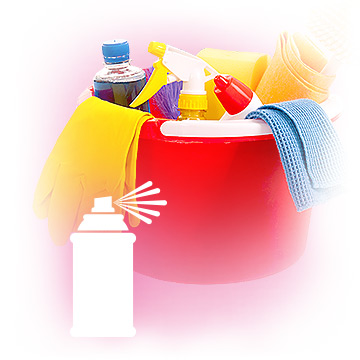
Contact with various household chemicals while pregnant can lead to a number of complications, such as miscarriage or developmental delays8. These might include insect repellents, lead-based paint, paint thinners, air fresheners, and more.
A good habit to develop before even conceiving is reading the labels for information on the product's toxicity. It is always best to stay away from using harsh household chemicals, or at least wear protective gear, such as gloves or masks, and instill proper ventilation measures. Switching to natural cleaners, such as vinegar or baking soda, is a good approach, too.
Key Takeaways
While it is essential to be aware of where the dangers lurk that might lead to complications, like miscarriage or birth defects, focusing too much on the things to avoid during pregnancy can be a source of stress and anxiety, which – ironically - can also be harmful to the baby. Many of the most important pregnancy precautions are common sense, including smoking, drinking alcohol, using harsh household chemicals, or eating raw and unpasteurized foods. Others might be a little less obvious, though equally significant. These include changing the litter box, being overly stressed, or working too strenuously. Luckily, with care and knowledge, these pregnancy precautions can be easily replaced with healthier behaviors for optimally healthy outcomes.
Sources
- Food Safety.gov. (2019). People at Risk: Pregnant Women. Retrieved September 3, 2019 from https://www.foodsafety.gov/people-at-risk/pregnant-women
- Office on Women's Health. (2019). Staying healthy and safe. Retrieved September 3, 2019 from https://www.womenshealth.gov/pregnancy/youre-pregnant-now-what/staying-healthy-and-safe
- Sutter Hospital. (n.d.). Special Precautions for the Pregnant Woman. Retrieved September 3, 2019 from http://www.babies.sutterhealth.org/during/preg_precautions.html
Footnotes:
- American College of Obstetricians and Gynecologists. (2019). Exercise During Pregnancy. Retrieved September 3, 2019 from https://www.acog.org/Patients/FAQs/Exercise-During-Pregnancy?
- American College of Obstetricians and Gynecologists. (2018). Nutrition During Pregnancy. Retrieved September 3, 2019 from https://www.acog.org/Patients/FAQs/Nutrition-During-Pregnancy?
- Current Opinion in Psychiatry. (2015). Anxiety, depression and stress in pregnancy: implications for mothers, children, research, and practice. Retrieved September 3, 2019 from https://www.ncbi.nlm.nih.gov/pmc/articles/PMC4447112/
- Pregnancy, Birth & Baby. (2018). Toxoplasmosis. Retrieved September 3, 2019 from https://www.pregnancybirthbaby.org.au/toxoplasmosis
- Kids Health. (2017). Pregnancy Precautions: FAQs. Retrieved September 3, 2019 from https://kidshealth.org/en/parents/pregnancy-precautions.html
- NHS. (2017). Drinking alcohol while pregnant. Retrieved September 3, 2019 from https://www.nhs.uk/conditions/pregnancy-and-baby/alcohol-medicines-drugs-pregnant/
- NHS. (2016). Stop smoking in pregnancy. Retrieved September 3, 2019 from https://www.nhs.uk/conditions/pregnancy-and-baby/smoking-pregnant/
- Pregnancy, Birth & Baby. (2018). Toxic household products to avoid during pregnancy. Retrieved September 3, 2019 from https://www.pregnancybirthbaby.org.au/toxic-household-products-to-avoid-during-pregnancy
